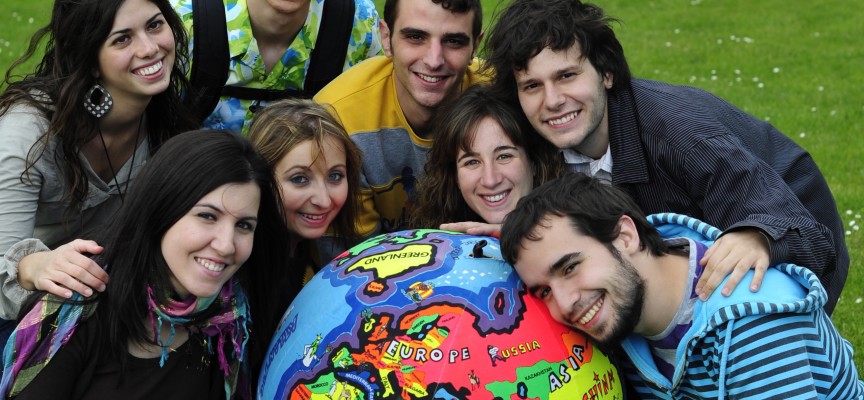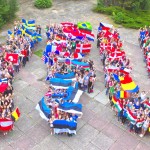“Imagine that, just off Trafalgar Square, Place Vendôme, Times Square, Schwarzenbergplatz, or Piazza Venezia, there is a wall dividing into two parts London, Paris, New York, Vienna, or Rome. Imagine that the inhabitants of a part are prohibited from going into the other, and that the inhabitants of the other part are allowed to go to the opposite part only occasionally, provided they complete special formalities”.
These were some thoughts about the Wall. 25 years ago the Berlin Wall finally fell, but are we sure that all the invisible walls in Europe have fallen along?
The European Union began its journey in 1950, with the Schumann Declaration but, for many years, it did not have the chance to embrace the citizens, the population of the countries that lied beyond the famous “iron curtain.” On the night of the 9th of November, 1989, the fall of the Berlin Wall finally healed this wound, solved this situation. But are we sure that Europe after this “endless night” has become a single, strong, and uniform Union? I don’t think so.
After 25 years there are still walls separating those who live in the Old Continent. Walls that cannot be seen, but they are in our streets and our minds. These walls are made up of the problems in international and multilateral politics, in the economy, across the different cultural approaches and ways of understanding the world. The very outcome of the last European elections, in fact, could be interpreted as a sign of these difficulties we are experiencing. How could we possible bring down these walls? Only through knowledge.
This knowledge should be developed and widespread by young people: a crucial role is played by those who have not only the opportunity to travel but also to go living abroad. Our young people today who have lived, are living now, or are willing to live this kind of experience, will break down all these walls that are invisible, but still divide. Only by getting to know the daily life other European citizens (not foreign, but European!), only by becoming familiar with their values, their mentality, and their limits, it will be possible to break down all the walls that can be found in London, Paris, Vienna, and Rome. I do not mean it is not difficult, or that the experience of exchange programs such as Erasmus or other similar ones in other countries is an easy experience. But surely, it is eventually worthwhile. Erasmus, in the same way as other opportunities to live outside one’s own country, implies difficulties, especially at the beginning. There are many things you have to do for the first time: to catch a flight on your own, to search for an apartment, to speak a foreign language, to understand a different university system, or to accept a different way of living on a daily basis. The first months are difficult: patiently, you have to build a new life in a new country. However, you are never alone in this journey: you meet other students who share your same feelings, the same fear in the face of something new. But this is the treasure of Erasmus: a new journey you begin on your own and you conclude together with many people. Despite all the hardship, you will get to know not only the country of destination, but also the habits of other Erasmus students, whom you will join along the way. Step by step all divisions, all stereotypes, all the walls scattered across the whole of Europe and, above all, in our minds, will fall.
So, one question remains: Are you patient enough to live this experience and bring down your personal walls about Europe and European citizens? Only then, perhaps, we will begin to put into practice a true idea of Europe.
“Immaginatevi che, poco lontano da Trafalgar Square, poco lontano da Place Vendôme, poco lontano da Times Square, da Schwarzenbergplatz, da Piazza Venezia ci sia un muro che divide in due parti Londra, Parigi, New York, Vienna, Roma; immaginatevi che agli abitanti di una parte sia proibita l’entrata dall’altra parte, che agli abitanti dell’altra parte invece sia consentito l’ingresso nell’altra, ogni tanto, solo con l’espletamento di formalità particolari”.
ALCUNE frasi che parlano del Muro: da 25 anni finalmente il Muro di Berlino è caduto; ma siamo sicuri che tutti i muri invisibili che ci sono in Europa siano anch’essi caduti?
L’Unione Europea ha incominciato il suo cammino nel 1950 con la Dichiarazione Schumann e, per molti anni, la futura Unione Europea non ha avuto la possibilità di abbracciare i cittadini, la popolazione dei Paesi che erano al di là dell’ormai famosa “cortina di ferro”. Nella notte del 9 novembre 1989 finalmente la caduta del Muro ha risolto questa ferita, questa situazione. Ma siamo sicuri che l’Europa da quella “notte infinita” sia diventata un’Unione unica, forte e uniforme? Io non lo credo.
Dopo 25 anni ci sono ancora muri che separano le persone che vivono nel Vecchio Continente. Muri che non si possono vedere, ma che attraversano le nostre piazze e le nostre menti: questi muri sono costruiti dai problemi che ci sono nella politica internazionale e multilaterale, nell’economia, tra le diverse culture e modi di concepire il mondo. Il risultato delle ultime elezioni europee, di per sé, potrebbe essere interpretato come una traccia di tutto ciò, di queste difficoltà che si stanno vivendo. Com’è possibile far cadere questi muri? Solo attraverso la conoscenza.
Quella conoscenza che dev’essere sviluppata e diffusa dai giovani: chi ha non solo la possibilità di viaggiare ma soprattutto di vivere all’estero ricopre un ruolo fondamentale. I giovani, oggi, che hanno vissuto, stanno vivendo o vorranno vivere questo tipo di esperienza potranno abbattere tutti questi muri che sono sì invisibili, ma che dividono ancora. Solo con la conoscenza della vita quotidiana di un altro cittadino europeo (sì, non straniero, ma europeo!), solo con la conoscenza dei suoi valori, della sua mentalità, dei suoi limiti sarà possibile abbattere tutti i Muri che ci sono a Londra, Parigi, Vienna e Roma. Non voglio dire che non sia difficile, che un’esperienza di un programma di scambio come Erasmus o altre esperienze in altri Paesi siano cosi facili. Ma sicuramente, alla fine, ne vale la pena. Erasmus, come le altre possibilità per vivere fuori dal proprio Paese, è difficile, in particolare all’inizio. È una serie di “prime volte”: prendere da soli per la prima volta un aereo, cercare da soli un appartamento in cui vivere, parlare una lingua straniera, comprendere un altro sistema universitario, capire e accettare una modalità diversa di vivere la quotidianità. I primi mesi sono difficili: con pazienza, infatti, si deve costruire una vita nuova in un nuovo Paese. Nonostante questo, però, non si è mai da soli a vivere questo viaggio: s’incontrano altri studenti che condividono gli stessi sentimenti, la medesima paura di fronte a qualcosa di nuovo. Ma proprio questa è la ricchezza dell’Erasmus: iniziare da soli un nuovo viaggio e concluderlo, invece, con molte persone. Nonostante tutte le difficoltà, si conoscerà non solo il Paese di destinazione, ma anche le abitudini di altri studenti Erasmus, che si affiancheranno nel viaggio. Passo dopo passo tutte le divisioni, tutti gli stereotipi, tutti i MURI che sono disseminati per l’intera Europa e, soprattutto, sono presenti nelle nostre teste, cadranno.
Quindi, rimane un’unica domanda: tu hai abbastanza pazienza per vivere questa esperienza e far cadere i tuoi muri personali sull’Europa e sui cittadini europei? Solo così, forse, cominceremo a vivere una vera idea di Europa.
Elisabetta Legnani
Latest posts by Elisabetta Legnani (see all)
- Walls are still there after 25 years - 1 dicembre 2014
- In the name of Erasmus - 3 luglio 2014











